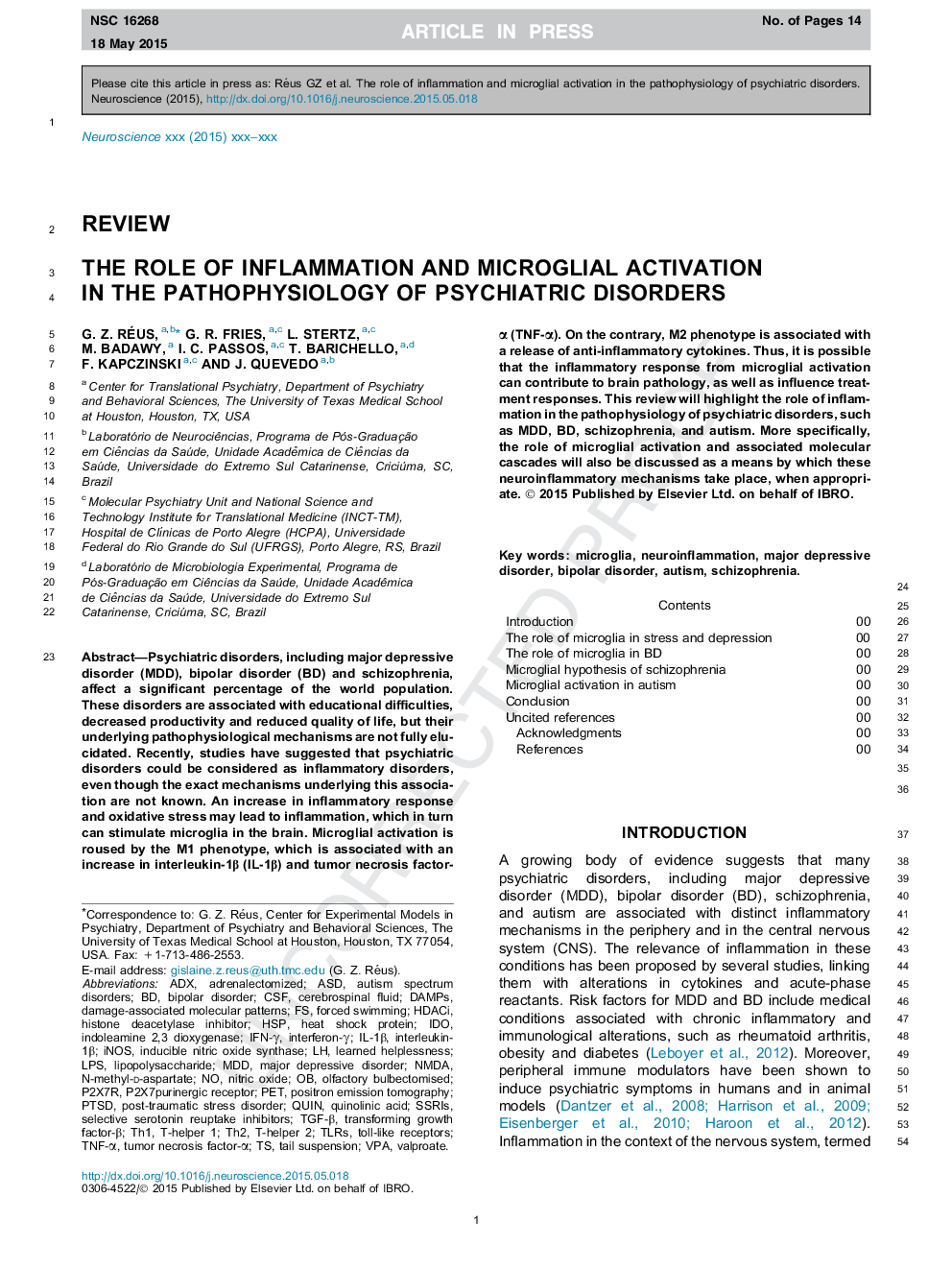| کد مقاله | کد نشریه | سال انتشار | مقاله انگلیسی | نسخه تمام متن |
|---|---|---|---|---|
| 6271941 | 1614776 | 2015 | 14 صفحه PDF | دانلود رایگان |
عنوان انگلیسی مقاله ISI
The role of inflammation and microglial activation in the pathophysiology of psychiatric disorders
ترجمه فارسی عنوان
نقش التهاب و فعال سازی میکروگلیال در پاتوفیزیولوژی اختلالات روانپزشکی
دانلود مقاله + سفارش ترجمه
دانلود مقاله ISI انگلیسی
رایگان برای ایرانیان
کلمات کلیدی
IFN-γadrenalectomizedTGF-βTh2Th1VPAP2X7RQUINIDOSSRIsHDACiADXN-methyl-d-aspartateNMDAIL-1βHspiNOSDAMPsMDDLPST-helper 1 - T helper 1T-helper 2 - T helper 2TLRs - TLR هاpost-traumatic stress disorder - اختلال استرس پس از ضربهPTSD - اختلال استرسی پس از ضایعه روانیMajor depressive disorder - اختلال افسردگی عمدهbipolar disorder - اختلال دو قطبیautism spectrum disorders - اختلالات طیف اوتیسمSchizophrenia - اسکیزوفرنی یا شیزوفرنیQuinolinic acid - اسید کینولینیکNeuroinflammation - التهاب عصبیdamage-associated molecular patterns - الگوهای مولکولی مرتبط با آسیبAutism - اوتیسم یا درخودماندگیinterferon-γ - اینترفرون-γInterleukin-1β - اینترلوکین-1βIndoleamine 2,3 dioxygenase - ایندولامین 2،3 دی اکسیژنازlearned helplessness - بی تفاوتی آموختtransforming growth factor-β - تبدیل فاکتور رشد βTail suspension - تعلیق دمtumor necrosis factor-α - تومور نکروز عامل αPositron emission tomography - توموگرافی گسیل پوزیترونValproate - سدیم والپرووات inducible nitric oxide synthase - سنتاز اکسید نیتریک القاییForced swimming - شنا کردن اجباریTNF-α - فاکتور نکروز توموری آلفاlipopolysaccharide - لیپوپلی ساکاریدCSF - مایع مغزی نخاعیCerebrospinal fluid - مایع مغزی نخاعیselective serotonin reuptake inhibitors - مهار کننده های بازجذب سروتونین انتخابیhistone deacetylase inhibitor - مهار کننده هیستون داسیدلازMicroglia - میکروگلیاهاASD - نقص سپتوم یا دیوارهی دهلیزیNitric oxide - نیتریک اکسیدPET - پتHeat shock protein - پروتئین شوک حرارتToll-like receptors - گیرنده های پولی مانند
موضوعات مرتبط
علوم زیستی و بیوفناوری
علم عصب شناسی
علوم اعصاب (عمومی)
چکیده انگلیسی
Psychiatric disorders, including major depressive disorder (MDD), bipolar disorder (BD) and schizophrenia, affect a significant percentage of the world population. These disorders are associated with educational difficulties, decreased productivity and reduced quality of life, but their underlying pathophysiological mechanisms are not fully elucidated. Recently, studies have suggested that psychiatric disorders could be considered as inflammatory disorders, even though the exact mechanisms underlying this association are not known. An increase in inflammatory response and oxidative stress may lead to inflammation, which in turn can stimulate microglia in the brain. Microglial activation is roused by the M1 phenotype, which is associated with an increase in interleukin-1β (IL-1β) and tumor necrosis factor-α (TNF-α). On the contrary, M2 phenotype is associated with a release of anti-inflammatory cytokines. Thus, it is possible that the inflammatory response from microglial activation can contribute to brain pathology, as well as influence treatment responses. This review will highlight the role of inflammation in the pathophysiology of psychiatric disorders, such as MDD, BD, schizophrenia, and autism. More specifically, the role of microglial activation and associated molecular cascades will also be discussed as a means by which these neuroinflammatory mechanisms take place, when appropriate.
ناشر
Database: Elsevier - ScienceDirect (ساینس دایرکت)
Journal: Neuroscience - Volume 300, 6 August 2015, Pages 141-154
Journal: Neuroscience - Volume 300, 6 August 2015, Pages 141-154
نویسندگان
G.Z. Réus, G.R. Fries, L. Stertz, M. Badawy, I.C. Passos, T. Barichello, F. Kapczinski, J. Quevedo,
